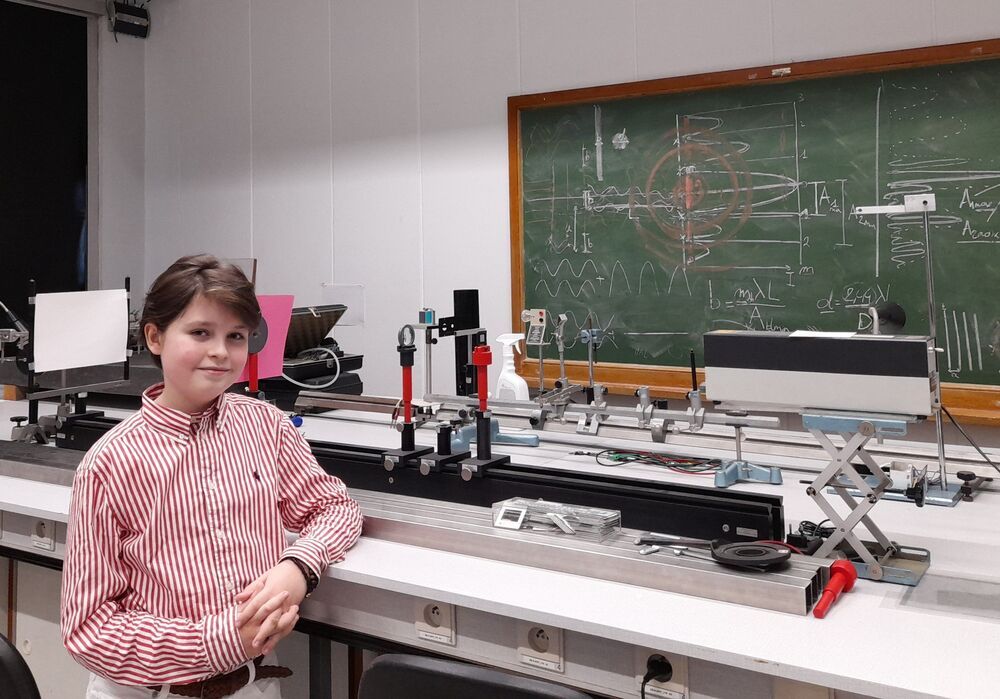Flaw was exploited when government officials clicked on links in LinkedIn messages.
Category: government – Page 113

Bad Dog? Research Suggests Superbug Link To Man’s Best Friend
“The trend for feeding dogs raw food may be fuelling the spread of antibiotic resistant-bacteria”, the researchers said in a press release for their study, to be presented at the European Congress of Clinical Microbiology & Infectious Diseases.
Separate research to be presented at the same conference found resistance to a last-resort antibiotic may be passing between pet dogs and their owners.
Antibiotic-resistant “superbugs” — which the World Health Organization calls one of the top global threats to public health — usually conjure images of hospital settings.

UK May Ban Boiling Lobsters Alive Under “Sentient Being” Law, So Can They Really Feel Pain?
Boiling lobsters alive may be banned under a new law in the UK designed to protect the welfare rights of animals considered sentient beings. So, are lobsters sentient, do they feel pain, and what does science have to say about the moral quagmire of crustacean agony and cooking pots?
Back in May 2021, the UK government introduced a bill to formally recognize animals as sentient beings. Among the many facets of the bill, it aimed to limit the import of products from trophy hunting, push for fairer space requirements for farm animals, and stop people from owning primates as pets.
However, the bill only covered animals with a backbone and didn’t include any protections for non-vertebrates, which includes octopuses, squid, insects, and crustaceans. The Times reports that ministers are now preparing to back an amendment to the House of Lords, the upper house of the UK Parliament, to extend the legislation to shellfish and cephalopod mollusks. As per the report, this is likely to involve an outright ban on boiling lobsters alive.
Daniel Schmachtenberger: Steering Civilization Away from Self-Destruction | Lex Fridman Podcast #191
Daniel Schmachtenberger is a philosopher and founding member of The Consilience Project. Please support this podcast by checking out our sponsors:
- Ground News: https://ground.news/lex.
- NetSuite: http://netsuite.com/lex to get free product tour.
- Four Sigmatic: https://foursigmatic.com/lex and use code LexPod to get up to 60% off.
- Magic Spoon: https://magicspoon.com/lex and use code LEX to get $5 off.
- BetterHelp: https://betterhelp.com/lex to get 10% off.
EPISODE LINKS:
Daniel’s Website: https://civilizationemerging.com/
The Consilience Project: https://consilienceproject.org/
PODCAST INFO:
Podcast website: https://lexfridman.com/podcast.
Apple Podcasts: https://apple.co/2lwqZIr.
Spotify: https://spoti.fi/2nEwCF8
RSS: https://lexfridman.com/feed/podcast/
Full episodes playlist: https://www.youtube.com/playlist?list=PLrAXtmErZgOdP_8GztsuKi9nrraNbKKp4
Clips playlist: https://www.youtube.com/playlist?list=PLrAXtmErZgOeciFP3CBCIEElOJeitOr41
OUTLINE:
0:00 — Introduction.
1:31 — Aliens and UFOs.
20:15 — Collective intelligence of human civilization.
28:12 — Consciousness.
39:33 — How much computation does the human brain perform?
43:12 — Humans vs ants.
50:30 — Humans are apex predators.
57:34 — Girard’s Mimetic Theory of Desire.
1:17:31 — We can never completely understand reality.
1:20:54 — Self-terminating systems.
1:31:18 — Catastrophic risk.
2:01:30 — Adding more love to the world.
2:28:55 — How to build a better world.
2:46:07 — Meaning of life.
2:53:49 — Death.
2:59:29 — The role of government in society.
3:16:54 — Exponential growth of technology.
4:02:35 — Lessons from my father.
4:08:11 — Even suffering is filled with beauty.
SOCIAL:
- Twitter: https://twitter.com/lexfridman.
- LinkedIn: https://www.linkedin.com/in/lexfridman.
- Facebook: https://www.facebook.com/lexfridman.
- Instagram: https://www.instagram.com/lexfridman.
- Medium: https://medium.com/@lexfridman.
- Reddit: https://reddit.com/r/lexfridman.
- Support on Patreon: https://www.patreon.com/lexfridman

Sric3 Meetings
Join the SRIC3 final event big party!
Here’s where you can find the Zoom coordinates to join us celebrating the 2021 Space Renaissance Congress completed:
Though the voting process will remain open until Thursday July 15th, i am happy to announce that **we have elected the new President of Space Renaissance International, Prof. Bernard Foing, and the new Board of Directors!**
Hereafter the received votes so far, that assure we passed the quorum, and the election of our new leadership.
63, 77% of the having right to vote voted so far on the 3 final motions, namely:
Final Resolution: AYE 97, 73%, NAY 0%, ABS 2.27%
Thesis 1 Motion: AYE 93, 18%, NAY 0%, ABS 6.82%

VU raises $12M to remove cybersecurity friction from digital experiences
Pretty soon, people won’t have to provide a fingerprint or a driver license to prove their identity — if VU has its way.
The Argentina-based fraud and identity protection company announced $12 million in Series B funding Monday from backers including software developer Globant, as well as Agrega Partners, NXTP Ventures, Bridge One, the IDB Lab and Telefónica. The new funding gives the company total venture-backed investments of $20 million, CEO Sebastián Stranieri told TechCrunch.
Stranieri, who has worked in the cybersecurity industry for the past 20 years, got the idea for VU in 2007 after spending hours helping his grandmother verify her identity with the Argentinian government in what turned out to be a two-minute process.

I’m 11, I have a physics degree and want to make humans immortal
As someone with a passionate interest in longevity, transhumanism and biological immortality — I am naturally both excited and optimistic that medical technology will continue to advance in my lifetime — hopefully to the point where humanity has cured or at least greatly mitigated the signs & symptoms of most diseases as well as disabilities, radically expanded human biological lifespan regardless of age, and created a more dignified existence for all as a result of rapid breakthroughs in robotics, AI, automation, nanotechnology, 3D printing and biotechnology — which I hope in turn will largely eradicate poverty, disease, food & shelter insecurity, natural resource scarcity, environmental degradation and income inequality. I know that some of my likeminded friends are far more skeptical that we will ever see outright cures or significant mitigations for major diseases and disabilities — much less radical life extension or perhaps biological immortality in human beings — which are widely available on a commercial basis. They cite their belief that pharmaceutical giants, a plethora of not for profit organizations (i.e., American Cancer Society), and many other allegedly “self-interested parties” supposedly allied with government regulatory bodies — apparently do not want to see diseases or disabilities cured or lifespan significantly extended — EVER — as this would prevent them from earning untold sums selling treatments and supports for such things on a regular ongoing basis (i.e., chemo drugs for cancer, statins for cardiovascular disease, inhaled/oral steroids for lung disease, renal replacement therapy for kidney disease, mobile supports for spinal cord injuries, ect.) They believe that too much money would be at stake, too many jobs on the line and the entire “pharma-medical-academic industrial complex” supposedly at great risk, if actual cures or significant mitigations ever saw the light of day. Some of these friends even cite their belief that fully autonomous, accident proof, self-driving cars will most likely never occur — as it would supposed put the entire auto insurance industry at existential risk as well as deprive law enforcement agencies of a key source of reliable revenue (issuing speeding tickets) This one makes me giggle! 🤭 My friends also believe that radical life extension in human beings — much less biological immortality — would apparently upset the proverbial apple cart — where the “powers that be” are concerned — in terms of everything from the highly lucrative profits which are derived from pharmaceutical sales, old age homes, life and health insurance plans, personal financial services and all of the sales of key products and services associated with the aging process — to macroeconomic considerations such as the long term viability of government entitlement programmes. They believe that government regulatory authorities allegedly working at the behest of the aforementioned self-interested parties will always seek to delay, disrupt or even derail ANY and ALL significant progress into cures/mitigations for disease/disabilities, radical human life extension and/or human biological immortality. Apparently, new biotech start ups which do advance the aforementioned things are allegedly “always aggressively bought out by monopoly capital — with their cures and advances indefinitely suppressed” I personally tend to be more on the positive and optimistic side where these things are concerned — but perhaps these rather pessimistic arguments do have some validity — minus the implied conspiracy theory aspect. Do you think human beings will ever be “allowed” to truly be free from illnesses and disabilities? Will we ever be “permitted” to radically expand our lifespans or even become biologically immortal at some point? Please discuss.
I have already taken a few courses for a master’s in physics at the University of Antwerp and I want to complete it there. In a bachelor’s degree you get a basis of knowledge in physics and quantum physics, but it gets more detailed in a master’s.
The main reason I chose to study physics is because my end goal is to achieve immortality. One of the areas that is important in the study of immortality is physics, but as of yet, there is no mapped out path to achieve it.
I am interested in immortality because my grandparents suffer from heart disease. I want to help them and I want to help other kids so they don’t have to lose their grandparents. You could look at immortality as a very big puzzle. We have a lot of pieces of the puzzle, which are different studies and research, and it’s possible that combining the knowledge from those studies will develop new insights and ideas. Something I am interested in is artificial organs; I would like to be able to replace as many parts of the body as possible with artificial organs. I plan to do a lot of studying, gather a lot of knowledge and then all the pieces will hopefully fit in together and the puzzle of immortality may be solved.
Vote for the President and Board of Directors Space Renaissance
The 2021 Space Renaissance Congress Acta is now online, and the voting session for the new President and Board of Directors is now open.
Dear SRI friends and supporters.
Two key milestones of our 3rd World Congress are now accomplished.
**1) The complete acta of the presented papers and speeches** is now online, for all of us to be viewed and reviewed. https://2021.spacerenaissance.space/index.php/2021-space-ren…ress-acta/
On this page you can find: * The presented papers, for download * The pointer to each live presentation, in the recorded videos on YouTube (hyperlink-pointer to the hour: minutes: seconds)
When watching to any video on the YouTube Space Renaissance channel, don’t forget to subscribe to the channel! (the channel is relatively recent, and increasing the number of subscribers is key to our web reputation).

Why ransomware attacks are on the rise — and what can be done to stop them
These attacks — along with news of several high-profile data breaches linked to the Russian government-backed hack of American software company SolarWinds, including at tech titans like Microsoft — have prompted questions about how these attacks have occured, and how to better guard against them.
State and local leaders testified June 17 before the Senate about how cyber threats they face have grown. And along with the increased penalties for cybercriminials included in a bipartisan Senate infrastructure package, a second bipartisan Senate bill would require public and private entities to report cybersecurity breaches to the government within 24 hours, as well as add liability protections to help encourage businesses to come forward.
Here’s what you should know as debate over cybersecurity and how to fight ransomware continues.
Japan wants to reignite its once-dominant silicon industry
The big picture: Japan’s share of global semiconductor sales has gone from 50 percent in 1988 to less than 10 percent today. The country has more chip factories than any other country — 84 to be exact — but only a few of them use advanced sub-10nm process nodes. This is why the country is scrambling to reignite its semiconductor industry, even if it comes at an incredibly high cost over the next decade.
The ongoing chip shortage has affected everything from LCD displays to graphics cards, game consoles, TVs, and even automakers. For consumers, this has created a hostile buying environment in some instances, while some governments have become acutely aware of the fragility of the global tech supply chain.
In the US, the Biden administration is trying to fix the situation by committing $52 billion towards boosting the local semiconductor industry, heeding the call of the Silicon Industry Association but at the same time falling short of the $100 billion that China is pouring into government subsidies for semiconductor companies.